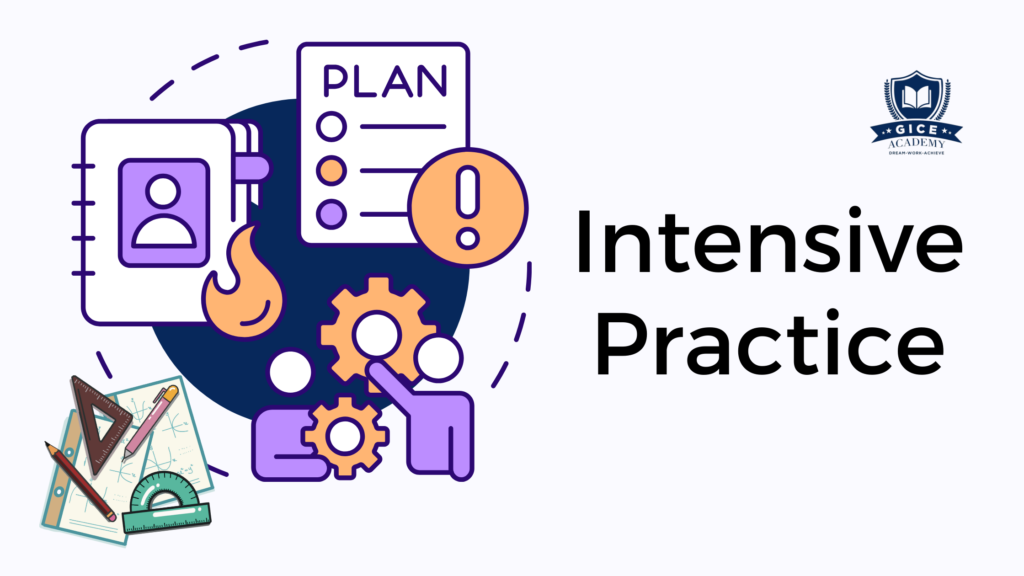Table of Contents
Preparing for the Common Admission Test (CAT) in just three months can be a challenging yet achievable task. This comprehensive guide offers a strategic approach, covering study plans, essential resources, time management techniques, and expert tips to help you ace the CAT exam in a short period. Whether you’re a working professional or a student, this guide will help you maximize your preparation and boost your confidence
Candidates can enhance their preparation by joining a Cat Crash Crouse , Cat Coaching Classroom Programme to receive study notes and a comprehensive guide for the CAT 2024 exam.
Month 1: Foundation Building
Preparing for the Common Admission Test (CAT) in three months might seem daunting, but with the right strategy and dedication, you can achieve a high score. The CAT is one of the most competitive exams for MBA aspirants in India, testing candidates on Quantitative Ability (QA), Verbal Ability and Reading Comprehension (VARC), and Data Interpretation and Logical Reasoning (DILR). This guide provides a detailed plan to help you prepare effectively in 90 days.
Week 1-2: Understand the Syllabus and Exam Pattern
- Syllabus Overview:Get familiar with the CAT syllabus and exam pattern. The CAT exam consists of three sections:
- Exam Pattern: CAT typically has 100 questions divided equally among the three sections, with a total duration of 180 minutes. Each correct answer awards 3 marks, and each incorrect answer deducts 1 mark.
- Quantitative Ability (QA)
- Verbal Ability and Reading Comprehension (VARC)
- Data Interpretation and Logical Reasoning (DILR)
Week 3-4: Collect Study Materials
- Books and Resources: Gather standard preparation books like Arun Sharma’s books for QA, VARC, and DILR, “How to Prepare for Verbal Ability and Reading Comprehension for CAT” by Meenakshi Upadhyay and Arun Sharma, and previous years’ CAT papers.
- Online Resources: Utilize online platforms like Unacademy, BYJU’s, and Career Launcher for video lectures and practice tests.
Week 5-6: Basic Concept Building
- Quantitative Ability: Start with basic concepts of arithmetic, algebra, geometry, and number systems. Focus on understanding the fundamental theories and solving basic problems.
- Verbal Ability and Reading Comprehension: Read articles, editorials, and books to improve your reading speed and comprehension. Practice basic grammar rules and vocabulary.
- Data Interpretation and Logical Reasoning: Solve basic puzzles, graphs, and charts. Focus on understanding different types of logical reasoning problems.
Month 2: Intensive Practice
Week 1-2: Practice and Strengthen Concepts
- Quantitative Ability: Practice problems from each topic daily. Solve at least 20-30 questions from different areas and focus on improving accuracy.
- Verbal Ability and Reading Comprehension: Take daily reading comprehension tests and practice verbal ability questions. Analyze your mistakes and work on vocabulary and grammar.
- Data Interpretation and Logical Reasoning: Solve sets of DI and LR problems daily. Practice different types of questions to build familiarity.
Week 3-4: Mock Tests and Analysis
- Take Mock Tests: Start taking full-length mock tests. Aim to take at least two mock tests per week. Simulate exam conditions to build stamina and time management skills.
- Analyze Performance: After each mock test, spend time analyzing your performance. Identify weak areas and focus on improving them. Understand the mistakes and avoid repeating them.
Week 5-6: Focus on Weak Areas
- Target Weak Areas: Spend extra time on the sections where you scored low in the mock tests. Practice more problems and clarify doubts.
- Review Concepts: Revisit important concepts and revise regularly. Make short notes for quick revision.
Month 3: Final Lap
Week 1-2: Advanced Practice
- Quantitative Ability: Focus on advanced level problems and mixed-type questions. Practice sectional tests to improve speed and accuracy.
- Verbal Ability and Reading Comprehension: Take timed practice tests to improve speed. Focus on critical reasoning and para jumbles.
- Data Interpretation and Logical Reasoning: Solve complex DI and LR sets. Practice sectional tests and focus on speed and accuracy.
Week 3-4: Revision and Final Preparation
- Revise Regularly: Spend the last two weeks revising all the topics. Focus on important formulas, concepts, and shortcuts.
- Take Final Mock Tests: Continue taking mock tests and analyzing them. Simulate the exam day environment and practice time management.
- Relax and Stay Positive: Keep stress at bay by maintaining a healthy lifestyle. Get adequate sleep, eat healthily, and stay positive.
Additional Tips for CAT Preparation
- Time Management: Efficiently manage your time by creating a study schedule. Allocate specific hours for each section and stick to the plan.
- Regular Practice: Consistency is key. Regular practice helps in building speed and accuracy.
- Mock Tests: Regularly taking mock tests helps in understanding the exam pattern, managing time, and improving performance.
- Sectional Tests: Apart from full-length mocks, take sectional tests to strengthen individual sections.
- Health and Well-being: Take care of your health. A healthy mind and body can significantly enhance your preparation.
Understanding the CAT Exam
Pattern and Syllabus
The first step in preparing for CAT is to understand its exam pattern and syllabus. CAT consists of three sections:
- Quantitative Aptitude (QA)
- Verbal Ability and Reading Comprehension (VARC)
- Data Interpretation and Logical Reasoning (DILR)
Each section has a specific number of questions and a time limit, making it crucial to be familiar with the pattern and type of questions asked. Here’s a breakdown

Understanding the syllabus is equally important. The syllabus for CAT includes various topics under each section. Here’s a brief overview:
Quantitative Aptitude:
- Arithmetic
- Algebra
- Geometry
- Number System
- Modern Math
Verbal Ability and Reading Comprehension:
- Reading Comprehension
- Grammar
- Vocabulary
- Sentence Correction
- Para Jumbles
Data Interpretation and Logical Reasoning:
- Tables
- Graphs
- Charts
- Logical Sequences
- Puzzles
Knowing the exam pattern and syllabus helps in creating a focused study plan and prioritizing topics based on their weightage and difficulty level.
Creating a Study Plan
With only three months to prepare, an effective study plan is crucial. Here’s how you can divide your preparation time:
Month 1: Foundation Building
- Week 1-2: Focus on understanding basic concepts and fundamentals.
- Week 3-4: Start practicing problems from each topic to strengthen your foundation.
Month 2: Intensive Practice and Mock Tests
- Week 1-2: Begin taking sectional mock tests to identify strengths and weaknesses.
- Week 3-4: Focus on improving weak areas while maintaining strengths.
Month 3: Revision and Full-Length Mock Tests
- Week 1-2: Revise all topics thoroughly and take full-length mock tests.
- Week 3-4: Analyze mock test results, work on time management, and fine-tune strategies.
Time Management Tips
- Allocate specific hours each day for each section.
- Take short breaks to avoid burnout.
- Use weekends for intensive study sessions and mock tests.
Focusing on Core Subjects
To excel in CAT, it’s essential to focus on the core subjects. Here are some preparation tips for each section:
Quantitative Aptitude (QA)
- Prioritize high-weightage topics like Arithmetic and Algebra.
- Practice problem-solving regularly to enhance speed and accuracy.
- Use shortcuts and formulas for quick calculations.
Verbal Ability and Reading Comprehension (VARC)
- Improve reading skills by reading newspapers, magazines, and books.
- Practice comprehension passages daily.
- Work on vocabulary and grammar through regular practice.
Data Interpretation and Logical Reasoning (DILR)
- Practice interpreting data from various sources like tables and graphs.
- Solve puzzles and logical reasoning questions regularly.
- Focus on accuracy and time management.
Practice and Revision Strategies
Regular practice and revision are key to success in CAT. Here’s how to effectively practice and revise
Regular Practice
- Solve practice questions daily from each section.
- Take weekly mock tests to simulate exam conditions.
Analyzing Mock Tests
- Review incorrect answers to understand mistakes.
- Identify patterns in errors to focus on weak areas.
- Track progress over time to adjust study strategies.
Revision Techniques
- Create summary notes for quick revision.
- Use flashcards for important formulas and vocabulary.
- Allocate specific days for revision of each section.
Tips and Tricks for Success
Here are some additional tips to enhance your CAT preparation:
Shortcuts and Tricks
- Learn shortcuts for mathematical calculations.
- Use elimination techniques for multiple-choice questions.
- Develop a strategy for time management during the exam.
Stress Management
- Practice meditation and mindfulness to stay calm.
- Take regular breaks and ensure adequate sleep.
- Maintain a healthy diet and exercise routine.
Staying Motivated
- Set realistic goals and reward yourself for achieving them.
- Join study groups or online forums for motivation and support.
- Visualize your success to stay focused and positive.
Crash Course: Enroll in a crash course 3 months before the CAT exam to gain rigorous practice and learn tricks and shortcuts. GICE ACADEMY offers a Crash Course designed to boost your concepts and speed.
FAQ’S
What are the essential topics to cover in Quantitative Aptitude for CAT?
Focus on Arithmetic, Algebra, Geometry, Number System, and Modern Math.
How often should I take mock tests during the 3-month preparation period?
Aim to take at least one mock test per week and increase the frequency in the final month.
What are some common mistakes to avoid during CAT preparation?
Avoid neglecting weak areas, overloading on study material, and not analyzing mock test results.
How important is it to solve previous years’ CAT papers?
Very important, as it helps you understand the exam pattern and types of questions.
How do I stay motivated during the 3-month preparation period?
Set realistic goals, join study groups, and visualize your success.









